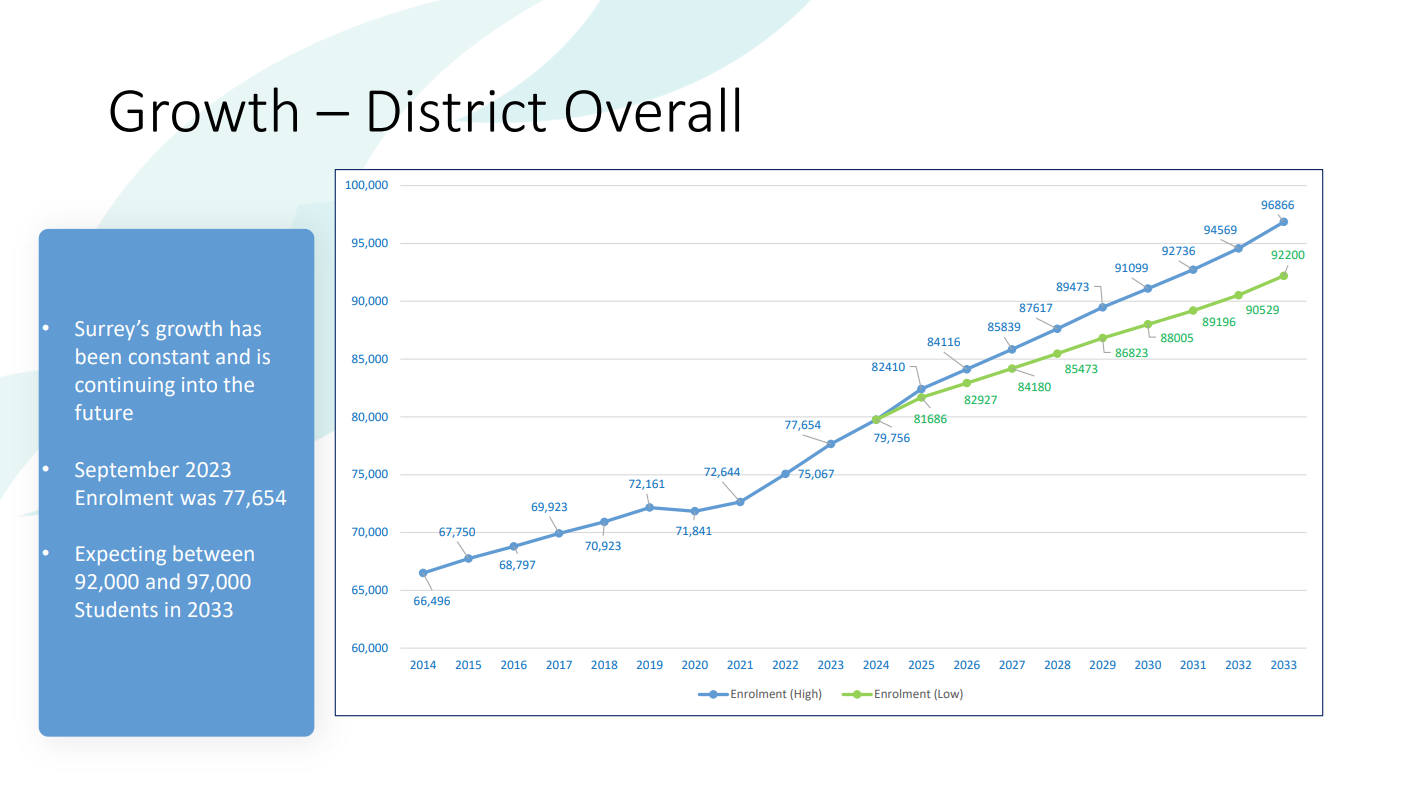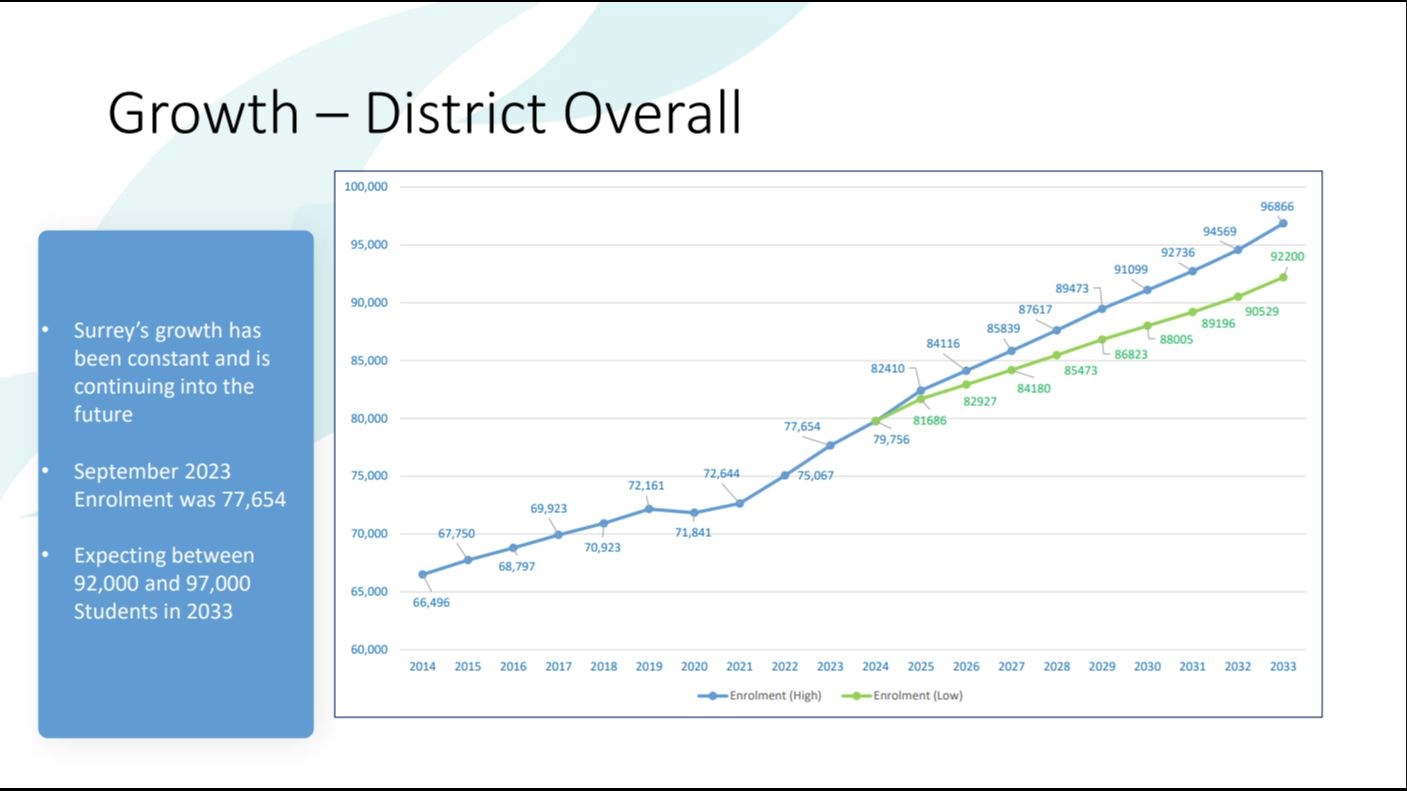Board approves 2025-26 five-year capital plan requesting $5B for student space needs
 According to 10-year enrolment projections, Surrey Schools is expected to have up to 96,866 students in 2033, as shown in the 2025-26 five-year capital plan presentation at the Surrey Board of Education's May public board meeting. Enrolment pressures remain among the most significant factors behind the district's need for capital funding, with the latest capital plan seeking $5.03 billion from the Ministry of Education and Child Care for 63 major projects.
According to 10-year enrolment projections, Surrey Schools is expected to have up to 96,866 students in 2033, as shown in the 2025-26 five-year capital plan presentation at the Surrey Board of Education's May public board meeting. Enrolment pressures remain among the most significant factors behind the district's need for capital funding, with the latest capital plan seeking $5.03 billion from the Ministry of Education and Child Care for 63 major projects.
In a record-setting funding request, the Surrey Board of Education has approved the 2025-26 five-year capital plan, seeking $5.03 billion from the Ministry of Education and Child Care for 63 major capital projects to address ongoing, exponential enrolment growth in Surrey and White Rock schools.
Presented at the May 8 public board meeting, the plan includes funding requests for 20 new schools, 19 additions, 21 site acquisitions, two school replacements and one seismic upgrade, as well as 19 building envelope projects. The staggering multibillion-dollar request is a 57% increase from last year’s capital plan, which sought $3.17 billion for capital projects.
“These last two years, we have seen an average of 2,500-plus students joining our district, and that’s net students, subtracting those that have left,” said Dave Riley, Executive Director of the district’s Capital Project Office. “At the present time, we do not see that pace of growth tapering off for the foreseeable future. We do believe this is our new reality for the next few years at least.”
Using 10-year projections estimating up to 96,000 students in 2033, Riley warned that many district zones are on track to remain or become significantly over capacity without more new student spaces, even with all supported projects in construction, design or business case stages taken into account.
Secondary schools in particular are at risk of severe overcrowding in the next decade, including those in Guildford (41% over capacity), Cloverdale/Clayton (31%), Newton/Fleetwood (17%), Panorama/Sullivan (12%) and City Centre (12%). Even with ministry support for an addition at Grandview Heights Secondary, the South Surrey/White Rock secondary schools are projected to be 53% over capacity without more capital projects, due to years of rapid and near-constant development in the area.
“This brings into light why we’re always talking about things like the budget, extended day, moving choice programs and boundaries,” said Trustee Bob Holmes. “Now we’ve asked staff to look into disruptive options like hybrid learning and year-round schooling. These were all necessitated by this problem we’re facing.
He said there was concern that implementing measures such as extended day would reduce the need for additional provincial funding.
“We’re well beyond that,” said Holmes. “We’re now at a point where we need both, and more.”
Since last year’s capital plan, the ministry has expressed support for seven capital projects, including two site acquisitions, the new Darts Hill Elementary and the Grandview Heights addition. However, of these, only the three prefabricated addition projects for Lena Shaw, Walnut Road and Woodland Park elementary schools are currently under construction.
“We always appreciate additions, expansions, new schools every time we get those, but clearly it wasn’t enough,” said Trustee Gary Tymoschuk. “It’s important to note that a lot of this is because of the SkyTrain corridor that’s rising, and we’re seeing already a number of projects coming to [city] council for approval, and in some cases already approved. There’s certainly a huge shopping list here and we certainly do need a lot of support from the provincial government.”
Trustee Terry Allen raised concerns around the cost of more portables if more school spaces aren’t built quickly, highlighting the average timeline of five years for a new school to open its doors.
“After passing the budget we just did that contained cuts to programs and extending school days, we do not have one more penny to put into portables at all,” said Allen.
Holmes referenced the B.C. government’s capital investment of $3.75 billion to support school development over the next three years, emphasizing that the Surrey School District’s request now exceeds the government’s commitment for the entire province. He noted the district’s need for space requires more than creative solutions, but rather teamwork at all levels to ensure there are enough classrooms for every student.
“We appreciate the help we’ve had so far, we know there are a lot of demands on the provincial government, but we need to find a different way,” said Holmes. “I’m hoping that we can keep working with the government, the city, maybe with developers and others to find different ways to solve these problems.
“We all have to work together, it’s the only way it’ll happen.”


